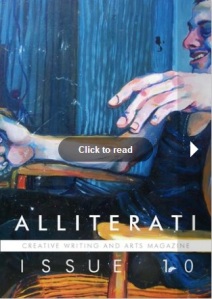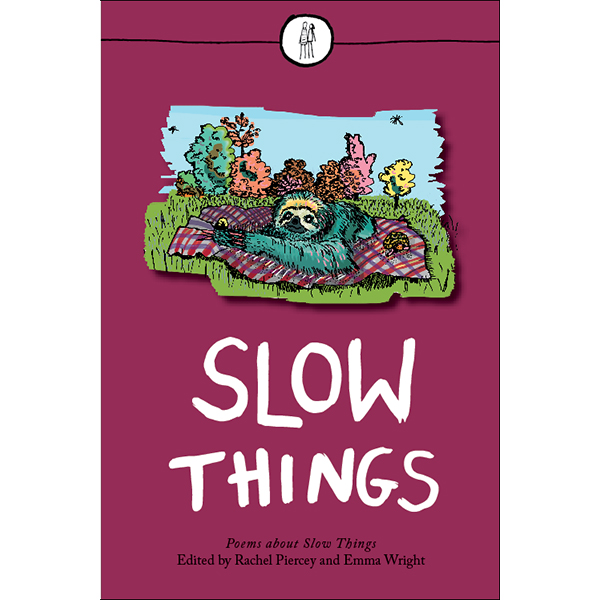Alliterati #10
-Reviewed by Cameron Brady-Turner–
It’s hard to know where to begin with Alliterati. Issue 10 was published free on Issuu in March and offers 88 pages of poetry, short-fiction, art and illustration, as well as a short script and sound piece to flick/click through. This issue also showcases the winning entries from a Valentine’s competition which challenged readers to take on the topic of Love without being Hallmark about it.
In browsing Alliterati you are promised eclecticism and colour from the off. The layout is spacious and unpretentious and appealed to me right away; as someone who has spent a lot of time with his nose in poetry journals it is nice to occasionally get away from an institution generally inclined towards right-angles and stencilled lines, monochrome and prickly serif fonts that can imbue a publication with the pomp and self-importance of a tax-form. This is perhaps a luxury of Alliterati’s online forum, since pixels are a cheaper commodity than ink, and the art certainly benefits from this freedom, as well as Issuu’s zoom features. I am no connoisseur, but I feel there is much to admire in terms of the art on display, which ranges from illustration, like Kris Tukiainen’s cartoonish ‘Heartbreak Eternal’, to Ella Dorton’s stunning painting (that is used for the front cover), and whilst the art is rarely used to complement the writing, it certainly livens and breaks the magazine up.
Alliterati’s submissions page states that it wants that which is short and striking, and certainly, the issue stays true to this by offering up poetry and prose like pic ‘n’ mix; bitesize, colourful, and, unfortunately, as nourishing. The problem seems to be that the writing hasn’t been edited properly: spelling, punctuation and grammatical mistakes are rife throughout, several sentences don’t make sense, other poems misuse words, while a fair few pieces simply shouldn’t be there. Openings like: ‘A young man, just nineteen, / Wound up in love with a beauty queen. / Caught in the mesh of true loves grasp, / He sealed it with a golden clasp’, made reading Alliterati feel like I was marking someone’s homework.
Alliterati has its moments however, and it’d be a shame to let them get overwritten by what happens to be around them. Jim Meirose’s quirky short story, about a young girl’s obstinacy as her parents try to move her off of a garden step, is probably the most interesting story thanks to its peculiar and possibly profound ending, whilst Daniel Bowman’s ‘After the Funeral’ renders capably and poignantly the ennui and entropy that has rotted a mother’s domestic family life . Meanwhile, I found ‘Long in the Memory’ by Joe Horsey charming and well-observed (albeit slightly juvenile) as it looks at how different members of a family approach new media; here the Dad remarks of mobile technology that
It’s all more sleek and subtle now,
and my thumbs are far to flat
to type much more than ‘pub?’ or ‘match?’
Emma Swan’s ‘Wilting Lily’ is a delightfully unnerving short piece about a woman’s mental breakdown, and there are some noteworthy moments in the otherwise scrappy ‘Drive’ by Matthew Rushton, a story about an abusive relationship which ends with probably the most resonant and disturbing image of the issue. Further to this, the poems for the Valentine’s competition that lead the magazine are probably some of the best on offer; in ‘Marriage: Day 4380’ Michelle Ornat writes:
I want you to reach up and pull down
Mars and Venus and a host of unnamed stars
and feed them to me until I am full,
until the light inside me weighs
more than my blood.
The juxtaposition of the hyperbolic and the everyday makes her poem one of the most emotionally attuned of the issue. Elsewhere, Megan Towey demonstrates some sparkling turns of phrase in ‘New Year’s Day’:
with my head like a getaway bag, hastily packed,
a floppy trammel of lost lists: lists of lies
told and believed that have since
turned into calcitrate in unsunned cloisters,
and I should know the dawn because I’ve seen it
and I should know the gap because I populated it
While at times garrulous, Towey’s work is admirably distinctive amongst Alliterati’s other offerings.
In spite of these promising moments, the pieces in this issue are often fairly flaccid pastiches that fail to make much of an impression. Alliterati doesn’t yet stand for anything (except for featuring predominantly young writers), and the uneven quality of the work jeopardises the magazine’s potential to establish itself as a brand. However, the magazine can only get better with more attentive editing, public attention and submissions; the foundation of an exciting brand-name, supporting artists and design is there, but at the moment the writing is a very mixed bag.




Pingback: Saboteur Awards 2013: The Shortlist | Sabotage